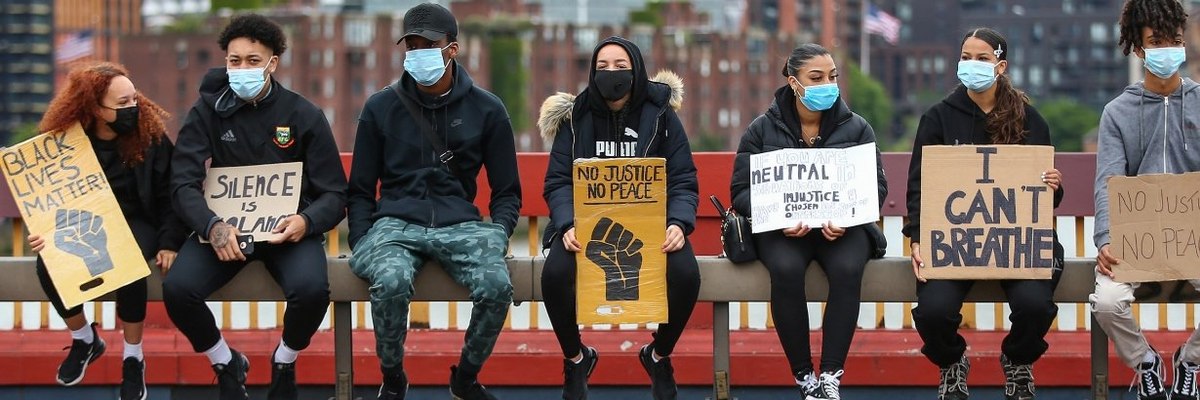Britons are among the most likely to think tackling racism should be a national focus
Nations across the world face a vast array of issues and problems, from defence to societal issues and climate change. All of which could be argued to be just as pressing of an issue as the others, so with so much to juggle, what should their focus be?
Data from the YouGov-Cambridge Globalism Project shows how people living in major western nations think their governments should prioritise certain goals.
Should tackling racism be a priority for the West?
The death of George Floyd in May 2020 brought discussions of societal racism across the Western world to the forefront once again, with major protests across the United States, UK, and Europe. The YouGov-Cambridge Globalism Project shows that large majorities in all countries surveyed believed it should be a medium or high priority for their nations.
Britain is among the top three of the nations surveyed who think combatting racism should be a “high priority” (55%), and a further 28% think it should be a “medium priority”. Only the Spanish (58%) and Greeks (59%) are more likely than Brits to think fighting racism should be a high priority for their nations.
The United States, on the other hand, is third from bottom among the countries included in the survey. While some 43% of Americans think tackling racism should be a “high priority” for the US, another 18% think it should be a low priority or not a goal at all.
Should Western nations build up their military forces?
With an ever-growing Russian military presence on the borders of Eastern Europe, how much of a priority do people in the West feel their military presence overseas should be?
The survey, carried out last summer, found that those closer to the east are among the keenest to see a build-up of their nation’s forces, including nearly one in three Greeks (29%) and 20% of Poles who say that it should be a high priority for their country.
Despite already having one of the biggest militaries, 22% of those in the United States think increasing their military reach overseas should be a high priority, and a further 28% think it should be a medium priority. However, some 19% of Americans think it should not be a goal at all.
Among Britons, one in nine (11%) think building the reach of the British military should be a high priority goal for the UK, compared to 18% who think it should not be a goal at all. Hungarians (32%) and Germans (30%) are among the most likely to think their countries should not focus on their military influence overseas at all.
Should reducing immigration be a priority for the West?
Immigration has become a pressing issue across Europe in recent years, as people flee from conflict and unrest in other parts of the globe. Repeated crossings of the English Channel by migrants have become a particular point of contention between the British and French – but is it a priority issue?
There is a general consensus across major western nations that it is – however some nations are more divided than others. The Greeks (58%) and French (44%) are the most likely to say reducing immigration should be a high priory target for their nations – as do similar numbers of Swedes (43%), Hungarians (42%), and Italians (42%).
Around a third of Britons (32%) think reducing immigration should be a high priority for the UK, while 23% think it should be a medium priority. On the other hand, 20% say it should be a low priority, and 17% say it should not be a goal at all.
Poles (24%) and Canadians (23%) are the least likely to say their nations should make cutting immigration numbers a high focus target.
Should the West prioritise the equality of women?
Issues such as the MeToo movement and the gender pay gap have revealed that the sexes are not perhaps as equal as many like to think they are. Approaching two thirds of Greeks think that pursuing and promoting women's equality should be a “high priority” target for their country, while 62% of Spaniards think the same and so do 55% of Italians.
While most people in each nation surveyed think promoting women's equality should be a high or medium priority, Britain and the United States come bottom of the list in terms of those who think it should be a high priority (both 37%). A quarter of those in the United States (26%) think this should be either a low priority or not one at all.
Should being carbon neutral be a priority for the West?
In 2021, the industrialised nations of the world came together for the COP-26 climate change conference. While it might not have achieved all of its aims, the build-up certainly helped increase awareness around the issue.
Asked shortly before the conference kicked off, the YouGov-Cambridge Globalism Project found most people across the nations surveyed to be in favour of moving their economy towards greener alternatives and away from carbon-heavy industries – with Hungarians the most likely to say this should be a high priority (61%). Sentiment is similar among Greeks and Spaniards with 60% and 57% respectively thinking a green economy should be a high priority goal for their nations.
Among Britons, 49% say moving towards an eco-friendlier economy should be a high priority target for the UK, while a further 30% think it should be of medium priority. Only 14% think it should be either a low priority goal or not one at all. Across the pond, 38% of Americans think changing their economy away from polluting industries should be a high priority target. Another 34% think it should be a low priority target if one at all – the highest among the nations asked.
See full results here














